Nobuyuki Sugihara (Art Director, Shinano Primitive Sense Art Festival) received an ACC Fellowship in 2019 to continue his research on Taiwanese indigenous culture and festivals, as well as connect with artists for his annual art festival in Nagano, Japan. Read more of his reflections below...
(Period of stay in Taiwan: September 24, 2019 ~ July 2, 2020)
Due to the Covid-19 pandemic, the Taiwanese government extended my stay in Taiwan for three months, enabling me to remain there for about eight months total researching Taiwanese aboriginal culture. Visiting Taiwan's Paiwan indigenous group's “Five-year Festival” in Pingtung; the Kacalisian Art Festival (Art Festival on the Slopes) where I worked on a month-long residency with Paiwan artisans using traditional stone-slab techniques; Makatao's Night Festival; the Taiwan Lantern Festival in Taichung; working at the Cepo' Art Center in Laeno, Hualien and at the National Taiwan Craft Research and Development Institute in Nantou; the Homeyaya (Millet Harvest Festival) where the Tao women of Lanyu Island perform the traditional “hair dance”; the Amis Music Festival in Taitung, and participating in the Taiwan East Coasts Land Arts Festival are just part of the many wonderful experiences I had.
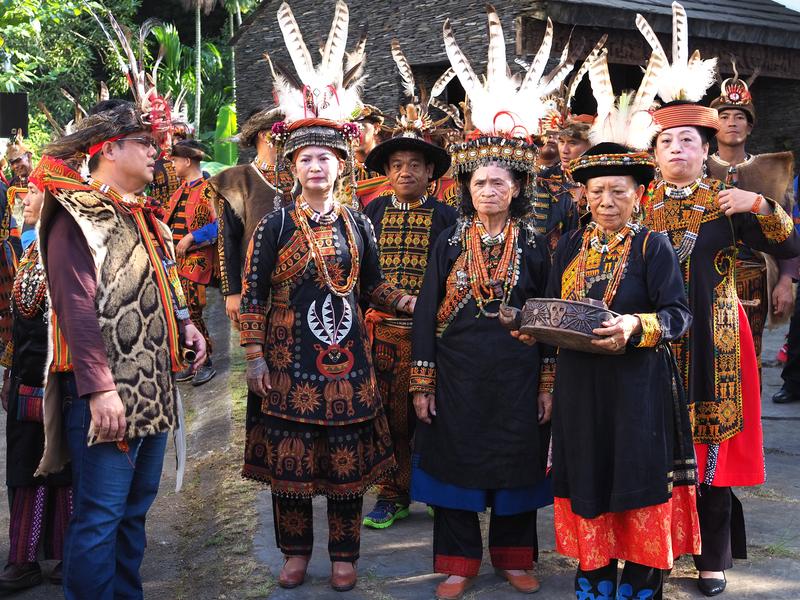
Paiwan indigenous group's “Five-year Festival”
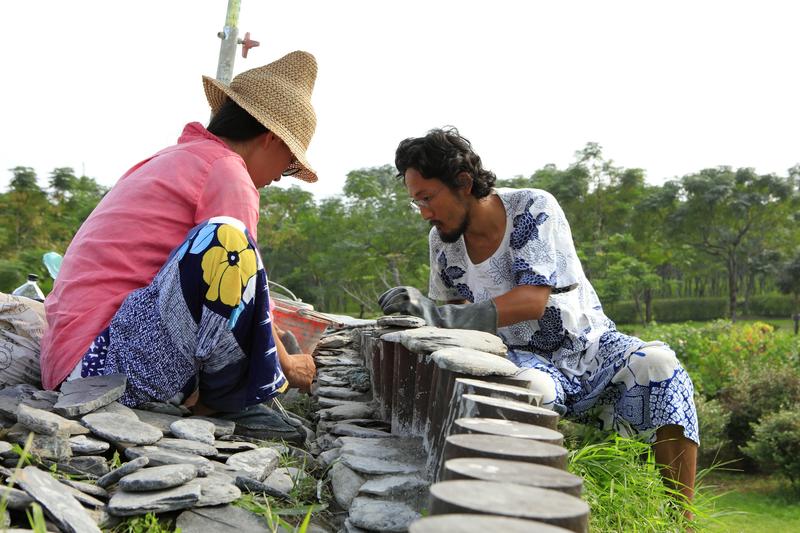

Left: Nobuyuki Sugihara and Ayaka Nakamura working at the Kacalisian Art Festival
Right: Friends at the Kacalisian Art Festival
During my stay, I was invited to a café in Makotaay Village in Hualien by Amis artist Sapud Kacaw, who had participated in the Primitive Sense Art Festival that I organize every summer. I was amazed to learn that Sapud not only made his own studio building, tables, chairs, art and food, but also sings, dances, fishes and hunts himself. It is a way of being before life and art were separated, also common in Japan before postwar economic growth. This was when our grandparents had nothing, so they made everything. In the case of indigenous communities, furthermore, myths are passed down, and it is that richness of life, often lost due to the division of labor in the city, which is filled with joy and beauty. The Amis, the most populous of Taiwan's indigenous groups, are a matriarchal society with a very strong female presence. Women are often at the top of cultural administration in Taiwan, and I believe this is largely due to the influence of the Amis. One of my major findings in this research was that aboriginal culture and the emancipation of women come in tandem.
The most expensive bill used in Taiwan is NT$1,000, which has a picture of boys, girls, a mountain and a bird on it. NT$500 has a picture of boy's baseball team, a mountain and a deer, and NT$100 has a picture of Sun Yat-sen and a building. The most expensive bill has a picture of children and nature and the least has a great historical figure. I think the fact that the money is associated with the image of children as the bearers of the future symbolizes Taiwan's creative society, valuing children and women and a love for nature and festivals. Japanese bills, in contrast, symbolize a male-centered economy and authoritarianism.
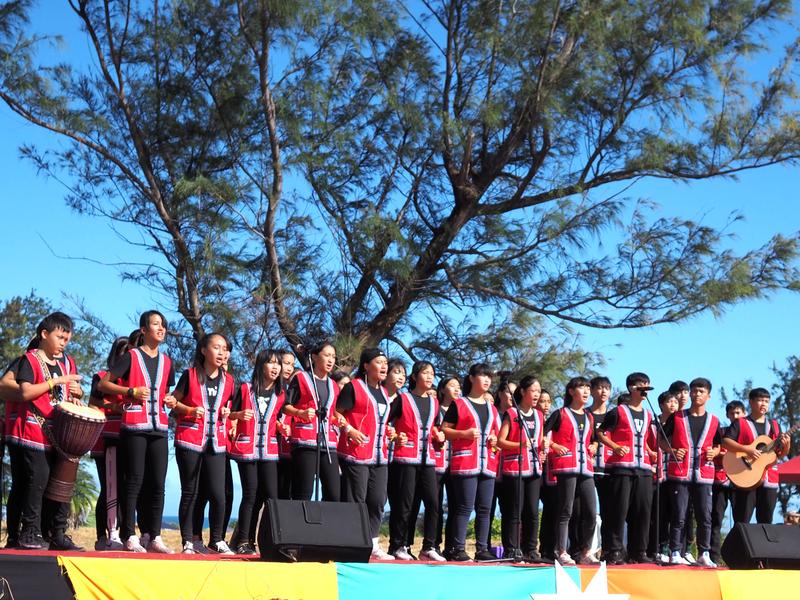
The Amis Music Festival
I attended the Amis Music Festival in Dulan, Taitung. It was a terrific event. Professional aboriginal musicians were featured on the big stage, while traditional songs and dances performed by various aboriginal artists from throughout Taiwan took place on the small stage. I was mostly drawn to the traditional songs and dances on the small stage, which often transcended the performance of the top billing musicians. Listening to songs sung by aboriginal middle and high school students, I was struck both by their sincere, passionate singing and their heartfelt expressions. Through the years, aboriginal life and culture have been radically changed by Japanese rule, assimilation policy by the government, Christianity and modernization. However, the spirit of the culture is carried on mainly through festivals where people wear traditional dress and sing in circle by holding hands. I felt that the conscience of Taiwan is based on the heart and soul of the indigenous communities, who have inherited their myths and live with the land.
People in Taiwan naturally care for others, live with hope and get angry at injustice. In today's Japan, such common sense, to be honest with and considerate of others, is collapsing, especially among those in power. The morals and virtues of the good old Japanese are in the process of being lost. I think this is because of the separation and segmentation of all facets of our lives. Only politics, only economics, only livelihood, and only art; a society created by indifference and disengagement, confined to one's own framework. In the past, Taiwan was ruled by martial law for a long time, but people resisted and won a liberal and creative society. I believe that now is the time for us to reclaim our relationship with all things and reclaim what is natural to us. Art and beauty are indispensable to everything and everyone.

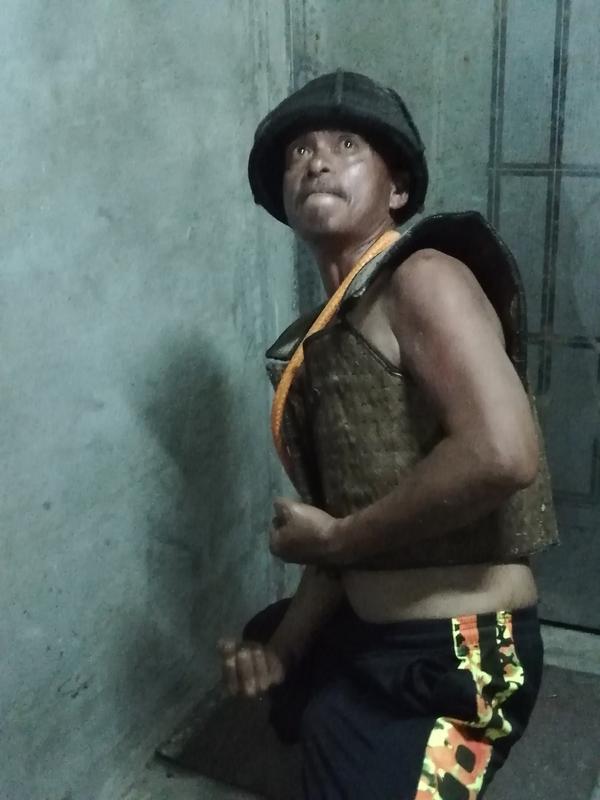
Left: Tao’s Homeyaya (Millet Harvest Festival); Right: Sugihara’s Tao friend from Lanyu Island
At the end of my research, I spent a few days living with the Tao community to attend their festival. The Tao people are afraid evil spirits will visit them during the festival. My Tao friend had tears in his eyes as he closed all the windows and doors, offered a cigarette to smoke and put on traditional clothes he inherited from his late father. This is a heart that is connected to where the memory resides in things, and to be clothed in it. Then, my friend made me wear his father's precious clothing, which holds his father's memories, and we posed together to express the excitement of the Tao people. The scene made a deep impression on me as an artist. It was an experience like witnessing the way Jomon pottery brings things to life.
I would like to continue my research with Taiwanese aboriginal communities in the future, as well as expand my research beyond Taiwan. I would like to thank the ACC for giving me such precious opportunities.
Nobuyuki Sugihara
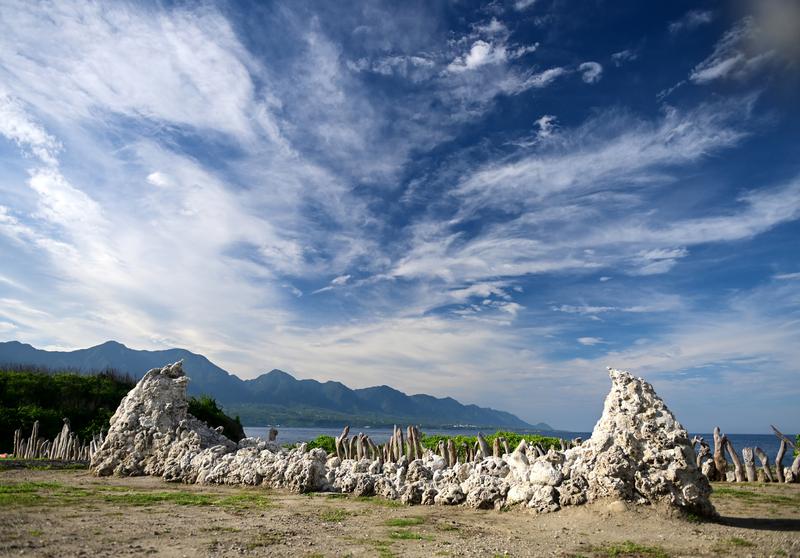
Sugihara Nobuyuki & Ayaka Nakamura “Waves of Ark – Intertwining Tides” at the Taiwan East Coasts Land Arts Festival, 2020 (Photo by 中文吳)
Grantee Reflections is a platform for ACC alumni to share their collective voice as an international community of artists, scholars, and cultural ambassadors. This is a cultural exchange of words, image, video, and sound from around the world. While our bodies cannot travel, our minds can still meet.
 ACC New York
ACC New York